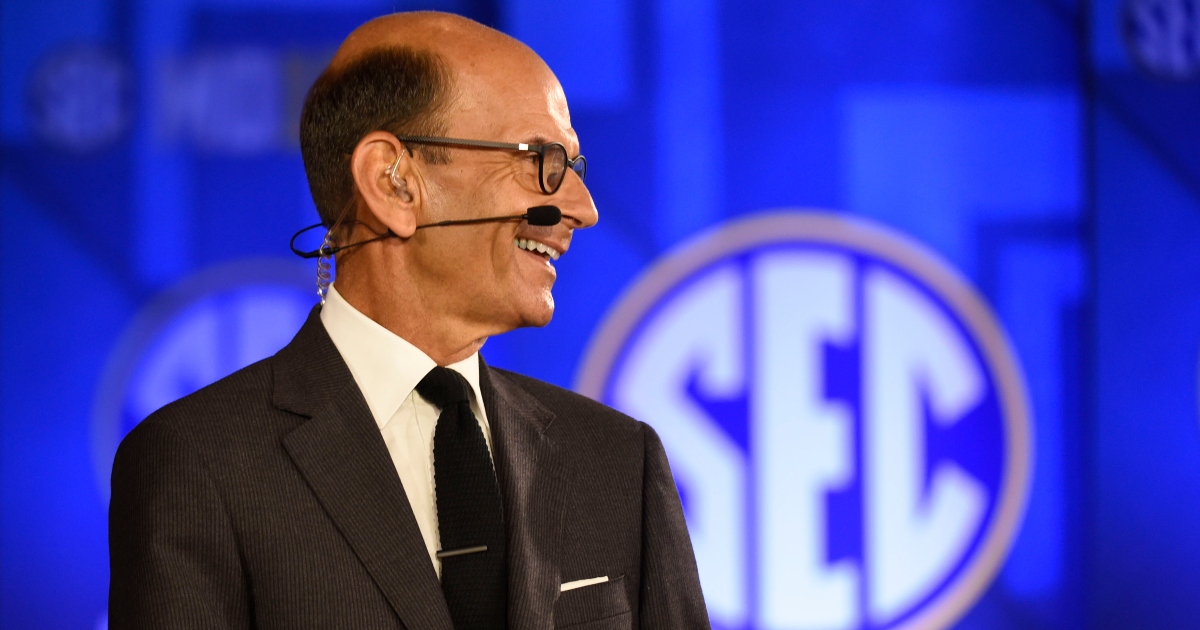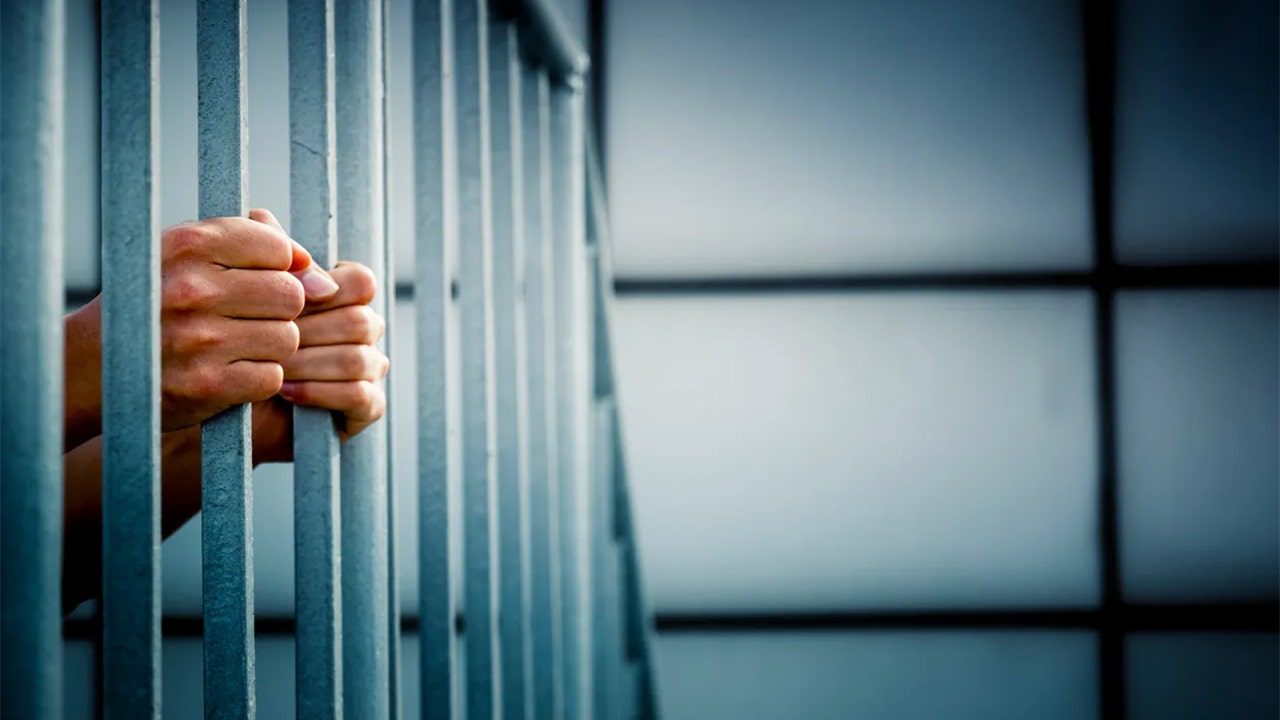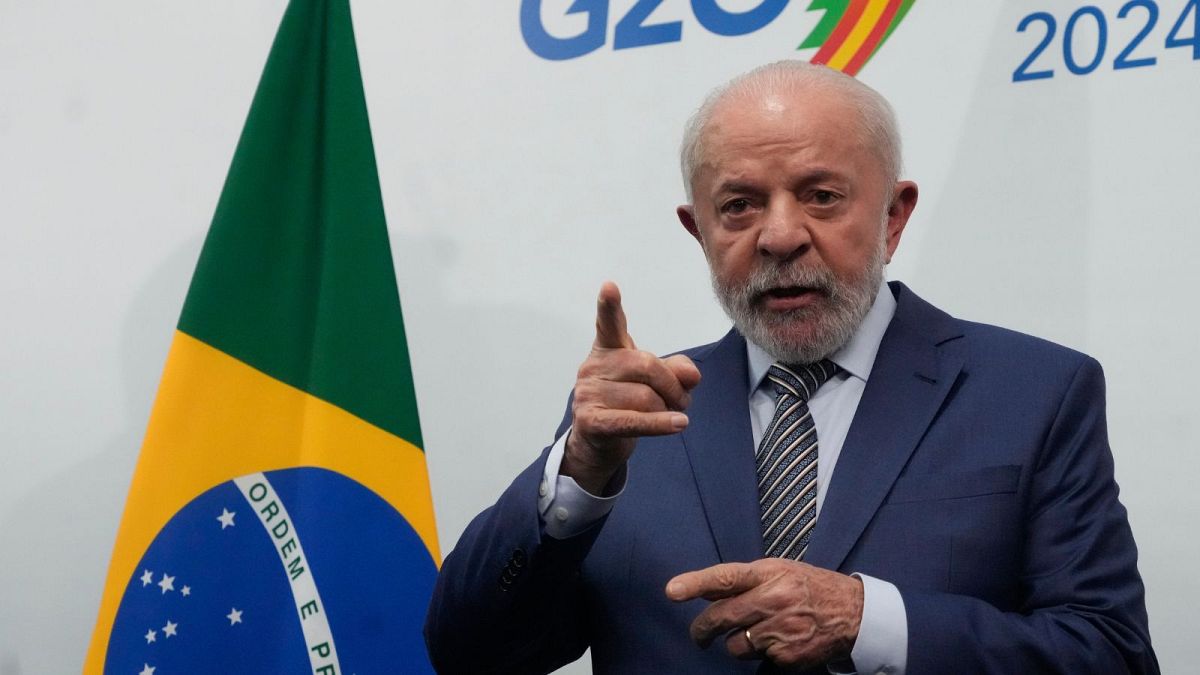Young Percy (Azriel Dalman) sees Antonio Canova’s “Perseus With the Head of Medusa” at the Met Museum
Disney
World
How ‘Percy Jackson’ Updated the Book’s Medusa Storyline to Get Closer to the Original Myth: ‘She Was Victim of Rape’

SPOILER ALERT: This story contains spoilers for “We Visit the Garden Gnome Emporium,” Episode 3 of “Percy Jackson and the Olympians.”
For fans of Rick Riordan‘s “Percy Jackson and the Olympians” books, Medusa represents one of Percy’s first big victories: After being tricked into spending time with “Aunty Em,” he beheads the snake-haired woman, and her cursed, dead eyeballs are later used to turn another enemy into stone.
But for those with a deeper knowledge of Greek mythology, and for many women, Medusa is a symbol of something darker.
In the original myth, Medusa is a human woman who takes a vow of celibacy out of devotion to Athena, the goddess of wisdom. However, Medusa eventually enters a relationship with sea god Poseidon that becomes sexual one night. Many interpretations posit that the encounter, which took place in Athena’s temple, was nonconsensual, and that Poseidon raped Medusa. Athena decides to punish Medusa, robbing her of her beauty by turning her into a gorgon that petrifies anyone she makes eye contact with. The story ends with the demigod Perseus — who Percy Jackson is named after — decapitating Medusa and gifting her head to Athena.
The 2005 novel was written for a middle school audience and understandably didn’t delve into that backstory. But Percy is the son of Poseidon, and Annabeth, who joins him on his quest, is the daughter of Athena, so both have loaded lineages in the presence of Medusa. So in the TV adaptation of “Percy Jackson and the Olympians” now airing on Disney+, the gorgon’s relationships with the kids’ parents gets unpacked with more depth.
Rebecca Riordan, who is married to Rick and executive produces the TV series, says that “the only reason Medusa is not more fleshed out in the books was that it was Percy’s narrative and we don’t have her perspective,” as the books are written in first-person. “As a 12-year-old boy in 2005, I don’t think he had the bandwidth for deconstructing the patriarchy,” adds Rick. “He was looking at it as, ‘This is a scary woman who’s trying to turn me into stone.’”
But that changed upon entering a TV writers room, where other perspectives become essential. “It was one of the first things we talked about, how to not have a patriarchal lens,” Rebecca says.
Medusa is first mentioned in the pilot episode, when Percy’s (Walker Scobell) mother Sally (Virginia Kull) takes her young son (played in a flashback by Azriel Dalman) to New York’s Metropolitan Museum of Art and shows him Antonio Canova’s early 1800s statue of Perseus holding Medusa’s severed head. “Not everyone who looks like a hero is a hero, and not everyone who looks like a monster is a monster,” she says to Percy.
Then, in Episode 3, Percy and his quest-mates, Annabeth (Leah Sava Jeffries) and Grover (Aryan Simhadri), end up lunching with Medusa (Jessica Parker Kennedy). Unlike in the “Lightning Thief” book, the kids realize who the gorgon is immediately, but Percy decides to take his chances with her as she’s the kids’ only option for refuge while being chased by the Alecto (Megan Mullaly), one of the Furies sent by Hades to capture Percy. Annabeth and Grover reluctantly follow. Then Medusa, sensing Annabeth’s anger towards her and allegiance to Athena, tells her side of the story.
“Athena was everything to me. I worshipped her; I prayed to her; I made offerings. She never answered, not even an omen to suggest she appreciated my love,” Medusa says. Then, correctly assuming that Annabeth isn’t as close to her mother as she’d like to be, she adds, “I wasn’t like you, sweetheart. I was you. I would have worshipped her that way for a lifetime: in silence.”
“But then one day, another god came, and he broke that silence. Your father,” she continues, now speaking to Percy. “The sea god told me that he loved me. I felt as though he saw me in a way I had never felt seen before. But then Athena declared that I had embarrassed her and I needed to be punished. Not him. Me. She decided that I would never be seen again by anyone who would live to tell the tale.”
“Percy Jackson” co-creator and co-showrunner Jon Steinberg — who credits writer Daphne Olive for steering much of this storyline — explains how the episode gestures at the original myth while keeping it age-appropriate: “If you know what she’s talking about, you know what she’s talking about. If you’re too young to be in that conversation, it won’t bother you. You’re just in a scene about this woman who seems complicated. And everybody’s got an opinion about what went down. There’s no version that is the version. If Athena and Poseidon were in that room, you’d get three different versions of that story.”
And even though her character never uses the language of sexual assault, Kennedy felt resolute in her interpretation: “Jon wrote a story of [Medusa] thinking that [Poseidon] was someone she could trust, and he broke that trust. She was feeling safe, and then the situation turned unsafe,” she says. “So I chose to play that she was a victim of rape and total abandonment, not understanding why Athena would turn on her.”
Similarly, Rick’s explanation is simple: “There are many versions from ancient times of what happened in that temple with Medusa and Poseidon and Athena. Who’s to blame? Who’s the abuser? What’s the real story? It’s fiction, but it certainly is important to acknowledge that there is abuse involved here. Abuse of power.”
Since Medusa is traditionally thought of as a villain — and she does try to turn the kids into stone at the end of the episode — introducing a nuanced narrative of abuse required some care in the design of the character. She wears a flowy beige gown with a matching hat that just barely covers her dangerous eyes, along with high heels, red lipstick and a gold necklace. In short, she’s not monstrous. She’s beautiful.
“One of the most interesting changes that informed the way she looks is that in Medusa’s point of view, the real curse wasn’t making her ugly. It was making her invisible,” Rick says. “She has chosen, in this version, to own that. To be seen. To be elegant. She turns people into stone and uses that as art.”
Petrifying her enemies, as Rebecca points out, is how Medusa emotionally processes Athena’s curse: “She has been physically changed. She’s accepted herself the way she is, and the power that she has, but she’s also been traumatized,” she says.
Kennedy says she began to fully connect to this expression of Medusa once she received her costume. “She’s so stylish and grounded and calm, and that is hugely a front for the trauma she’s trying to hide,” she says. “She does all of these really awful things, and becomes a terrible person, but I wanted her to feel almost frighteningly calm and kind. I didn’t want her to have a scary voice. I wanted it to feel gentle, but I also wanted to leave a layer of how we know shit’s gonna go bad.”
“Another thing we did was show everybody the statue of Medusa holding Perseus’ head — the inverted story,” Rick says of Luciano Garbati’s 2008 statue that reimagines and reverses Medusa’s death. The piece has become a symbol of the #MeToo movement. “It’s a powerful piece of art to start a conversation about who’s telling the story.” Kennedy also credits this statue for helping her create her version of Medusa.

“Medusa With the Head of Perseus” by Luciano Garbati
Michael M. Santiago/Getty Images
This nuanced, kinder version of Medusa starts off with some version of good intentions when she meets Percy. She recognizes that like her, he struggles with feeling that Poseidon abandoned him.
“The studio execs were like, ‘Oh, this is going to be a story about Percy gaining his father’s love and respect?’ And it’s like, ‘No, that’s not the story!’ He has to go through: ‘What has my father done? Has he changed? How do I see myself in relationship to that?’” Rebecca says. “Percy can only judge his father by the wreckage he has left behind,” says Rick.
Once she gets a moment alone with him, Medusa offers to help Percy save his mother from Hades, which is his real goal on the quest, even though he’s been instructed to prioritize retrieving Zeus’ stolen lightning bolt. But to save Sally, Medusa implies, they would need to petrify Annabeth and Grover — a punishment for their loyalty to the gods. “There’s a part of Medusa that really thinks she can turn Percy,” Kennedy says. “She’s looking for allies, while knowing, ‘I’m gonna have to kill these kids. But maybe I can convince them: I’m the good guy. Your mom is not a good person. Your dad is not a good person. I was there for them. They weren’t there for me.’”
Of course, Percy refuses to fall into her trap. He ends up following in the footsteps of his namesake and beheading Medusa. But he does this to protect his friends, not Poseidon and Athena. Despite her demise, Medusa does real damage to Percy and Annabeth’s perception of their parents.
“Where [Percy and Annabeth] are most different is in terms of their upbringing,” Steinberg says, as Annabeth had been at Camp Halfblood for years, while Percy has only known that he’s a demigod for a week. “Annabeth is fully steeped in the the Olympian culture, the family culture of what you owe up [to the gods] in tribute and obligation.”
So for the first time, Annabeth has that culture challenged. “She has a calcified vision of her mother that has to change in order to get through this season and develop as a person,” Becky says. “This is the episode where you see that start. ‘Maybe my mom is not who I think she is. Maybe I don’t have to revere her.’”
And Percy, who was already angry about his father’s absence in his life, is shaken by Medusa’s suggestion that his mother’s relationship to Poseidon may not have been as sunny as she made it seem.
“There’s a third act to that subplot of Medusa and Poseidon and Sally that you haven’t seen it yet. It comes in Episode 7, a really powerful flashback scene where you see Sally and Poseidon together,” Rick says.
“What’s most interesting to me [about Episode 3] is where it positions Medusa with respect to Sally, and an awareness that they both dated the same guy and had very different experiences,” Steinberg says. “I like that the story perceives that relationship from Percy’s point of view. It’s not entirely clear: Did they love each other? It seems like they did, but what went wrong? Did anything go wrong? Is it possible that Medusa had an awful experience with Poseidon and Sally didn’t?”
“It was important to leave that a mystery, but to not leave it unaddressed,” he concludes. “As we get deeper into the season, yes, this is Percy’s adventure, but parenting that kid is an adventure unto itself. A scary one. We wanted to tell that story too, and I don’t think you can tell that story without understanding what Poseidon and Sally were to each other. Long story short: They had a complicated relationship.”

World
Ralph Macchio on Why Now Was the Right Time to End ‘Cobra Kai,’ the Future of Daniel LaRusso and That Coldplay Music Video

Serendipity seems to follow Ralph Macchio — and it most recently took him to Australia.
In October, Coldplay released the song “The Karate Kid,” and it’s exactly what you think it’s about, down to the lyrics about “Daniel.” That, of course, is the name of the lead character played by Macchio in three “The Karate Kid” movies and six seasons of Netflix’s “Cobra Kai.” After Macchio heard the tune, he shared it on social media — and that’s when Coldplay concocted a plan. Frontman Chris Martin asked Macchio to come to Australia, where they were playing a series of dates, and film the music video. The ruse included bringing the actor on stage to help perform “The Karate Kid.”
“It was just one of those whirlwind things,” says Macchio, who just returned from Down Under. “It’s just a beautiful track. It blew my mind that he wrote the song, just from the film, which meant so much to him. We certainly had an impact 41 years ago, at least for a young Chris Martin and Coldplay. It never ceases to amaze me, the emotions and feelings that the original film still carries through the decades.”
Macchio is about to experience another one of those moments. As the final season of “Cobra Kai” posts its next five episodes (there are still five to go) this month, Macchio is set to receive his star on the Hollywood Walk of Fame. And his honor will be fittingly placed near the plaque for his late co-star Pat Morita, aka Mr. Miyagi.
“That’s just perfectly wonderful at this point in my life,” Macchio says. The actor, at a youthful 63, is somehow a decade older than Morita was in the original 1984 film. “It’s only fitting I will be Miyagi-adjacent till the end of time, and I couldn’t be prouder and more honored to have that kind of placement. I remember him saying having a star on the Walk of Fame was probably the biggest highlight of his career, coming from humble beginnings. So I’ll get to channel a little bit of the love that he still sprinkles on this ‘Karate Kid’ universe.”
It’s also a complete career full circle moment for Macchio, who remembers visiting the Walk of Fame as a teen in the late 1970s when he moved to Hollywood from his native Long Island, N.Y. to give acting a shot.
“It was the land of hopes and dreams, and I remember I would walk on Hollywood Boulevard looking for Gene Kelly’s star,” Macchio says. “I wanted to be Gene Kelly, ever since my youngest memory. I used to watch the old movie musicals with my mom. And so seeing all those names like Clark Gable, which come from a lot of the films and television shows that I grew up with, it never seemed obtainable.”
Before long, he had a regular role on “Eight Is Enough.” Then came his breakout role in Francis Ford Coppola’s 1983 feature “The Outsiders,” followed a year later by that life-changing moment in “The Karate Kid.” That crane kick. Wax on, wax off. Daniel-san. All iconic pop culture moments that are forever attached to Macchio. “People still remember where they saw ‘The Karate Kid,’” he says. “I’m incredibly grateful, and feel privileged to be blessed enough to bring joy to people through a character.”
He also starred in the first two “Karate Kid” sequels and held a major role in 1992’s “My Cousin Vinny,” the Joe Pesci starrer that is in endless heavy rotation on basic cable. “I always call it the late-for-dinner movie,” he says. “If it’s on, you’re going to be late for dinner because you have another setup that’s going to pay off and you have to stick to the next one.”
But then came the lean years, which Macchio chronicled in his recent memoir, “Waxing On: The Karate Kid and Me.” Macchio was inspired by the philosophy of one of his idols, Michael Caine, who talked about capitalizing on the difficulties you might face in acting and in life.
“I’ve learned to do that,” he says. “There were some difficult times as far as career goes and where I’d wanted it to be. But those are also the years that I was here for my kids at a very young age. It was perfect, especially with this great resurgence and groundswell act that I’m going through right now. I almost couldn’t have written it better, because I get to enjoy it, and it just keeps giving. I mean, the fans never let it disappear.”
Indeed, Macchio never stopped working. In the 2000s, he held a recurring role on “Ugly Betty” and was given several opportunities to play versions of himself — most of which he turned down. But he embraced a few, including on HBO’s “Entourage.”
“If I could tell you the amount of times it was pitched — I said no 90% of the time,” he says. “I went through a phase where I would joke that my name was more famous than I was. ‘Entourage’ was the first time I played myself, and so I was proud because it was a cool industry choice, and a pretty darn good episode as well.”
Then there was the Funny or Die parody “Wax On, F*ck Off,” from filmmaker Todd Holland, which toyed with Macchio’s nice guy persona by trying to turn him into a Hollywood bad boy. “It was the perfect time when people with bad behavior were being rewarded, and I considered myself a good guy,” he says. “So how could I try to make myself more relevant with what works in in Hollywood?
But the real groundwork for “Cobra Kai” came when he and William Zabka guest starred on “How I Met Your Mother” — in which Neil Patrick Harris’ character Barney wanted the hero of the “The Karate Kid” at his party. When Macchio showed up, he was disappointed as he’d considered Johnny Lawrence (Zabka) the good guy.
That dynamic, of course, became the heart of “Cobra Kai,” a new take on the “Karate Kid” characters from Josh Heald, Jon Hurwitz and Hayden Schlossberg. Around the time that show began development (originally at YouTube Originals), Macchio had landed a very different kind of role as a vice cop in HBO’s gritty drama “The Deuce.”
“He’s everything that you dream of when you’re think about meeting your heroes,” Hurwitz says. “He’s a kind person. He’s a family man. It extends to how he carries himself on set as the No. 1 on the call sheet. He’s a role model to a whole group of young actors on our show.”
Heald interjects: “It’s easy to see, upon meeting him for the very first time, that he’s one of the most authentic people you’ll ever meet. He is thoughtful as a performer and a producer and now a director, and in the way that you want as a collaborator.”
Now, as “Cobra Kai” ends, Macchio says the timing “just feels right” to “land it but in a great way.” But this isn’t the end for Macchio as Daniel LaRusso. He will revive the character again opposite Jackie Chan in “The Karate Kid: Legends,” which takes place three years after the events of “Cobra Kai.”
“It was not a quick decision, because it was about protecting the Daniel LaRusso character, and finding where he would be at that point, and then protecting the whole legacy in the Miyagi-verse,” says Macchio. “Once we were able to line that up, for the ‘Cobra Kai’ story to lead into the new film — even though they’re separate ecosystems — it all made sense for me. Then, working with Jackie was just super exciting. I started this on the big screen. How cool is it to get it back to the big screen?”
As for what’s next, Macchio is keen on pursuing more directing and hopes to help Heald, Hurwitz and Schlossberg turn a Mr. Miyagi origins series into fruition. Plus, he wants to explore other characters beyond the “Karate Kid” universe.
Will “The Karate Kid: Legends” mark his final bow as Daniel? “I don’t want to overstay the welcome of a character that’s so beloved,” he says. “But he’s aging like I am, so there could be other areas to explore as well. Never say never.”
World
US Embassy in Kyiv closed as 'potential significant air attack' looms
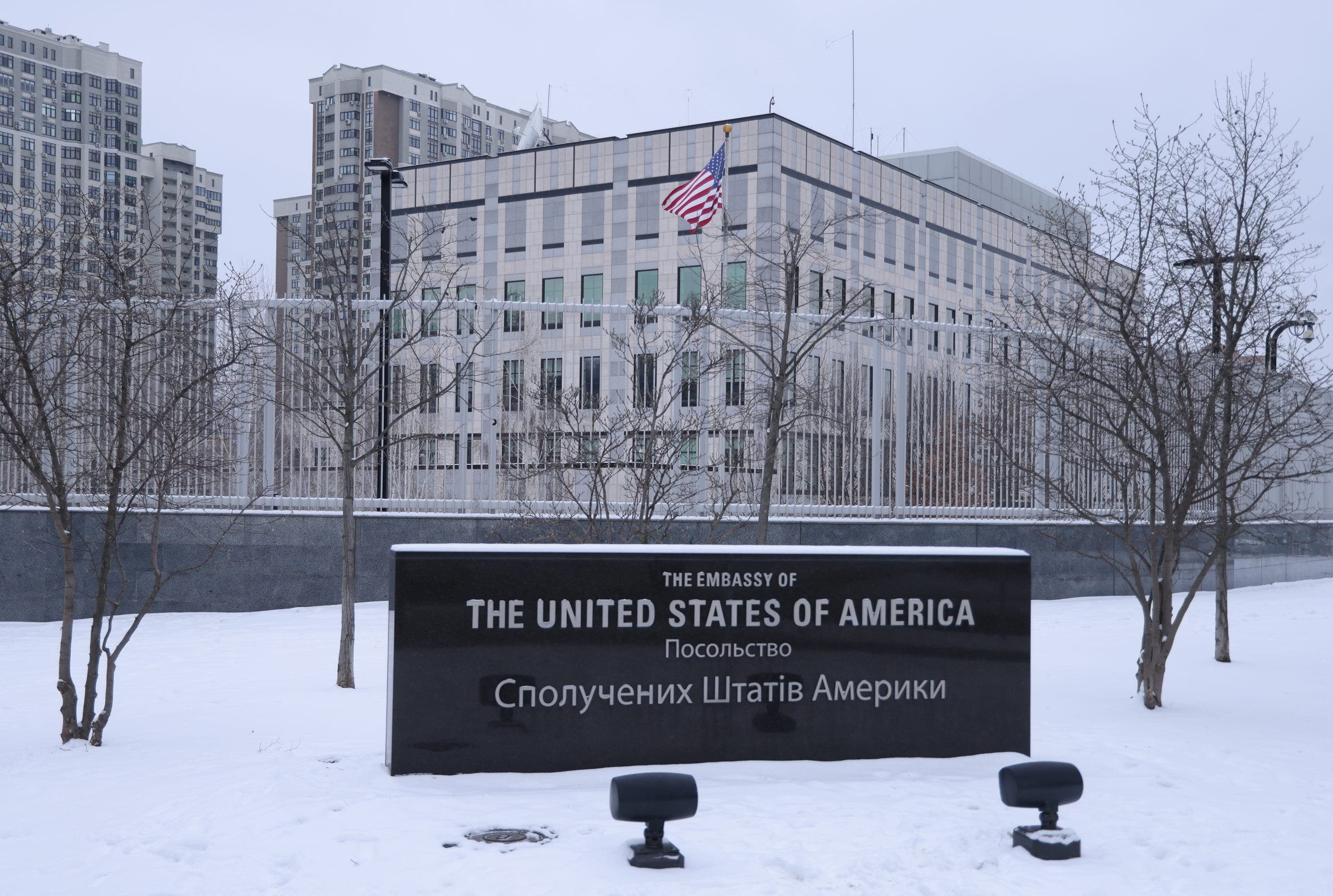
The U.S. Embassy in Kyiv, Ukraine, issued a warning after receiving “specific information of a potential significant air attack” allegedly taking place on Wednesday.
The embassy in Ukraine’s capital is temporarily closed following the alert and employees are being asked to prepare to shelter in place.
“The U.S. Embassy recommends U.S. citizens be prepared to immediately shelter in the event an air alert is announced,” the statement said.
PUTIN SIGNS REVISED DOCTRINE LOWERING THRESHOLD FOR NUCLEAR RESPONSE IF RUSSIA IS ATTACKED
FILE – The U.S. Embassy in Kyiv, Ukraine, has released a warning stating they have “specific information of a potential significant air attack” taking place on Wednesday. (Sean Gallup/Getty Images)
Employees have been asked to take the following actions:
- Monitor local media for updates
- Identify shelter locations in advance of any air alert
- Immediately take shelter if an air alert is announced
- Follow the directions of Ukrainian officials and first responders in the event of an emergency

A training session involving some 2,000 Ukrainian conscripts and veterans takes place in the muddy fields of the Champagne military camp in eastern France on Nov. 14. (REUTERS/John Irish)
This comes after Ukraine fired American-supplied long-range missiles into Russia on Tuesday, marking the first time for Kyiv to do so in the 1,000 days of war, which was authorized by President Biden on Sunday.
BIDEN AUTHORIZES UKRAINE TO USE US LONG-RANGE MISSILES TO STRIKE INSIDE RUSSIA
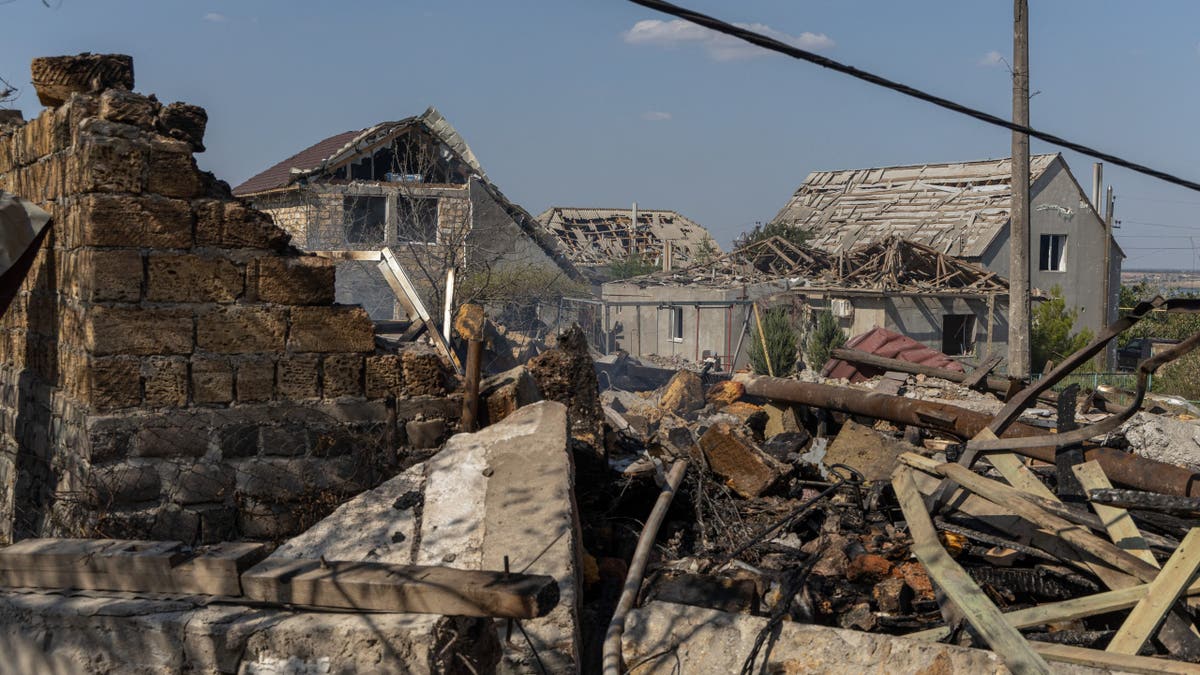
It has been over 1,000 days since Russia invaded Ukraine in early 2022, and the conflict remains very active. (Oleksandr Gimanov/AFP via Getty Images)
This was not the first time the embassy has issued a warning of potential danger and a significant attack.
A similar warning was issued around Ukraine’s Independence Day on Aug. 24.
Russian President Vladimir Putin signed a revised nuclear doctrine on Tuesday, warning that any attack on Russia supported by a country with nuclear power could be grounds for a nuclear response.
Fox News Digital’s Elizabeth Pritchett contributed to this report.
World
Sharp rise recorded in landmine casualties in 2023, warns report

Civilians, including children, make up 84 percent of landmine casualties, with the highest numbers last year in Myanmar.
The number of people killed or wounded worldwide by landmines and explosive remnants of war surged in 2023, according to a new report.
There were more than 5,700 casualties last year, the Landmine and Cluster Munition Monitor group said in its annual report published on Wednesday. The highest number was reported in Myanmar, while significant tolls were also recorded in Syria, Afghanistan and Ukraine.
The global total marks a rise of about 1,000 compared with the previous year. At least 1,983 people were killed and 3,663 injured across 53 countries. Civilians made up 84 percent of the victims, with children accounting for 37 percent, the report said.
Just over 1,000 casualties were reported in Myanmar, which is not party to the Mine Ban Treaty. Syria, which had for the previous three years the highest number of annual casualties, came next. More than 500 casualties were recorded in both Afghanistan and Ukraine.
“Landmines are inherently indiscriminate weapons, meaning that, by design, it is not possible for the mine to be deployed to target a specific person,” read the report. “Hence, casualties can occur among whoever triggers the mine, whether a child or a soldier, as well as anyone nearby.”
The report notes that not all landmine-related deaths and injuries are documented, suggesting the actual figures could be higher.
Alongside Myanmar, Russia, Iran, and North Korea are accused of laying new mines, continuing trends observed in previous years.
These countries have not signed the Ottawa Treaty, an international agreement that bans the use, stockpiling, production and transfer of antipersonnel mines.
The treaty has banned landmines since 1999, and 164 countries are parties to it. However, major powers including the United States, Israel and Russia are not signed up.
Washington was reported on Wednesday to be ready to provide landmines to Ukraine.
In a statement to the AFP news agency, the ICBL said it condemned “this terrible decision” by the US, and vowed to push for it to be reversed. The lobby group also called on Ukraine to “clearly state they cannot and will not accept these weapons”.
Non-state actors, including armed groups, have also been implicated in the use of landmines in conflict zones such as the Gaza Strip, Colombia, India, Myanmar and parts of Africa’s Sahel region, including Burkina Faso and Mali, according to the report.
The report also stated that landmines continue to be produced or procured in 12 countries, including China, Cuba, Singapore and Vietnam.
-

 News1 week ago
News1 week agoHerbert Smith Freehills to merge with US-based law firm Kramer Levin
-
/cdn.vox-cdn.com/uploads/chorus_asset/file/25724877/Super_Nintendo_World.png)
/cdn.vox-cdn.com/uploads/chorus_asset/file/25724877/Super_Nintendo_World.png) Technology1 week ago
Technology1 week agoThe next Nintendo Direct is all about Super Nintendo World’s Donkey Kong Country
-
Business7 days ago
Column: OpenAI just scored a huge victory in a copyright case … or did it?
-

 Health7 days ago
Health7 days agoBird flu leaves teen in critical condition after country's first reported case
-

 Business3 days ago
Business3 days agoColumn: Molly White's message for journalists going freelance — be ready for the pitfalls
-
World1 week ago
Sarah Palin, NY Times Have Explored Settlement, as Judge Sets Defamation Retrial
-

 Politics2 days ago
Politics2 days agoTrump taps FCC member Brendan Carr to lead agency: 'Warrior for Free Speech'
-

 Sports1 week ago
Sports1 week agoRoki Sasaki’s contract situation, signing process and suitors, explained

![How ‘The Good Doctor’ Series Finale Handled the Death of [SPOILER] — and Took Shape After a ‘Downsized’ Season 7 How ‘The Good Doctor’ Series Finale Handled the Death of [SPOILER] — and Took Shape After a ‘Downsized’ Season 7](https://variety.com/wp-content/uploads/2024/05/TheGoodDoctor.MAIN_.jpg?w=1000&h=563&crop=1)







